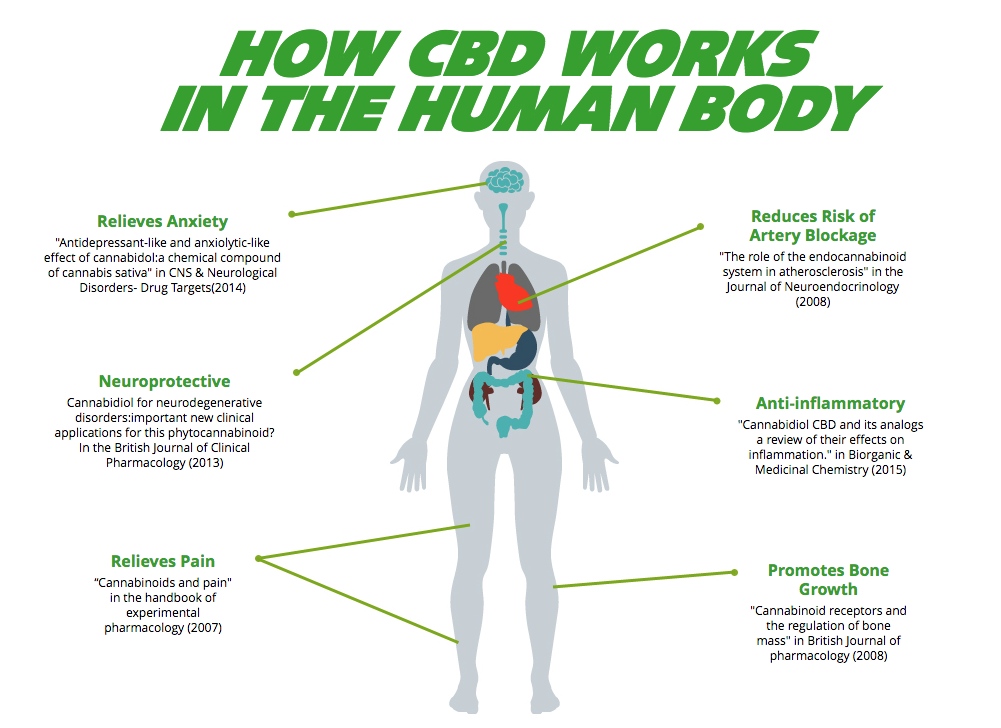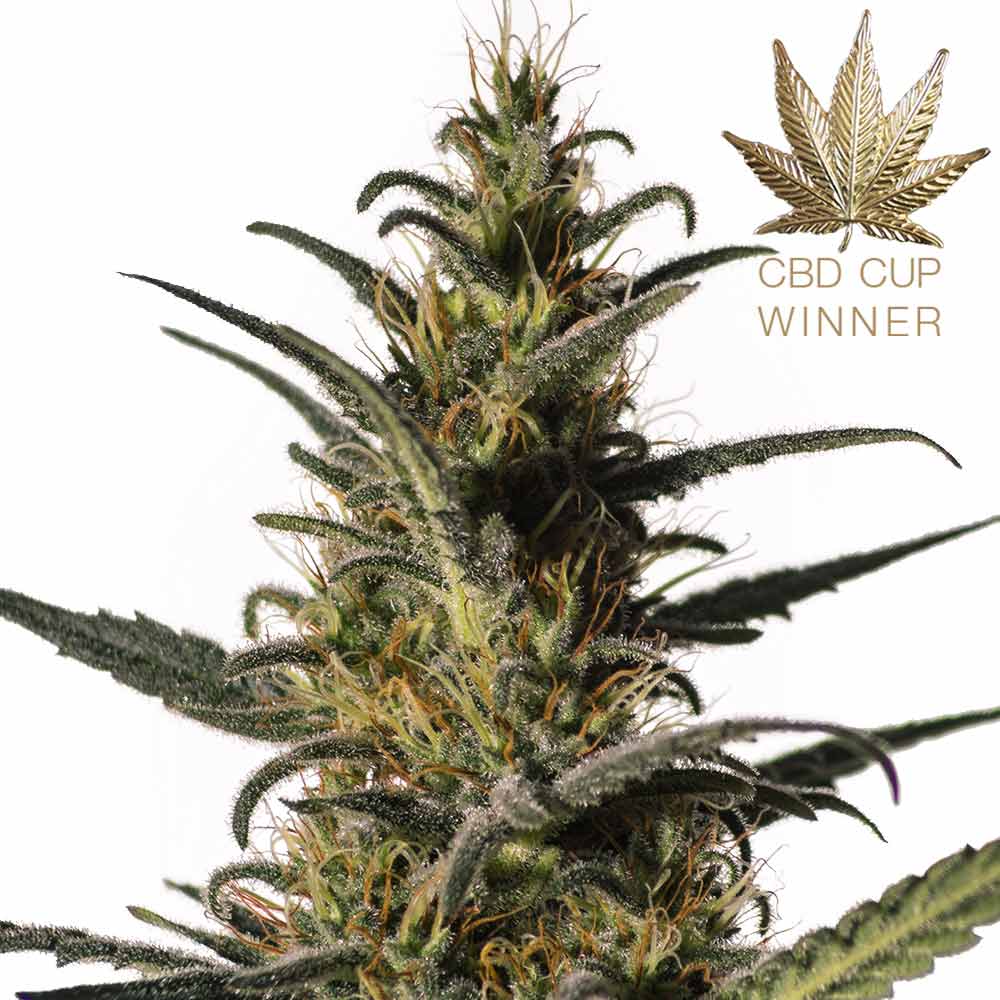Cannabis and Chronic Pain: How CBD Can Help Manage Pain
- Cannabidiol (CBD) has been reported by many new users to help manage their chronic pain
- We look into the “new health craze” to find out how it is helping patients both with their symptoms and their addictions to dangerous pharmaceutical medications
Words by Jessica Jones
Opioid abuse and overdose claimed an estimated 64,000 lives in 2016 alone.
President Donald Trump has recently declared opioid epidemic as a public health emergency and pointed it as the worst drug crisis in the national history.
This crisis raises an urgent need to find an effective solution to the addiction.
Research into cannabidiol (CBD) has shown a lot of potential to be used as a therapy for many addictions as well as for treatment of various disorders and chronic diseases including; cancer, nausea, diabetes, cardiovascular diseases and depression, without exerting long-term side effects.

Studies have shown that it can be helpful in counteracting the effect of opioid and alleviating withdrawal symptoms like anxiety, pain and nausea.
What is CBD?
CBD is a type of cannabinoid, a chemical compound found in many plants, but mainly associated with cannabis.
Unlike tetrahydrocannabinol (THC), the primary cannabinoid found in cannabis, CBD does not produce a psychoactive effect, meaning users do not experience the feeling of being “high” associated with typical cannabis use.
Another benefit of CBD is that it is not addictive, with a very low toxicity level.
CBD offers therapeutic effect thanks to its anti-inflammatory, anticonvulsant, antipsychotic, and antioxidant profile.

It is increasingly becoming popular due to its different recreational and medical benefits.
Benefits
Undergoing research has lifted the stigma associated with CBD and paved the way for research and use in medical industry.
However, it is important to understand that different strains of cannabis produce different effects depending on the ratio of CBD and THC present in it.
Recent research has shown CBD promotes ‘wakefulness,’ therefore has been recommended for treatment of anxiety and depression.
Patients looking to treat these symptoms should look for a strain with higher percentage of CBD and low THC, for example, CD1 (a recent cannabis cup winner) or Charlotte’s Web which have ratios of 20:1 CBD:THC

Some of the potential benefits that CBD is being used for includes:
- Cancer– Study conducted by the National Institute of Health has shown that cannabinoids have anti-tumor properties and reduce inflammation. It is also helpful in reducing the painful side effects of chemotherapy.
- Depression – A study from the University of Rio de Janeiro showed that CBD has considerable potential in treating anxiety and depression along with treatment for its symptoms like insomnia and nausea.
- Diabetes – A study published in the American Journal of Medicine found that cannabis use lowered the fasting insulin levels and lowers incidence of diabetes.
How does it work?
Every human body has a receptor system known as the Endocannabinoid System (ECS), which is responsible for maintaining and protecting body’s healthy state.
The human body, through the ECS, produces its own cannabinoids which can influence inflammation, pain, and mood.
Cannabis, and cannabis products such as CBD isolates, stimulates the ECS by supplementing these cannabinoids to help the body maintain a healthy functional state.
Cannabinoids from cannabis may be thought of as a “key,” which acts on receptors along the ECS.
The two receptors in the ECS are the CB1 and CB2.
CB1 receptors are located along the central nervous system, while CB2 receptors are more often found on immune cells, for example in the gastrointestinal tract or the peripheral nervous system.

CBD has the potential to alter the emotional reaction to pain. It does not directly affect the pain centers of the brain, hence is not addictive like opioids.
How can you use CBD?
The easiest and most efficient way to use CBD is in the form of an oil. CBD oil can also be taken in form of pills.

CBD is also available in the form of topical creams or tinctures which can be less concentrated than oil.
Topicals can be directly applied to the skin, especially useful for combating symptoms related to inflammation. These have been highly recommended by people suffering from arthritic joint pain or muscle aches.
CBD oil can even be consumed by vaping or sprays.
Vaping allows the medicine to enter body quickly while avoiding the harmful side-effects of smoking. Concentrated tinctures can be used as a spray under the tongue.

A new type of cannabis product delivers both quick and long-lasting relief without the high is CBD patches. For delivering medication into the bloodstream, these transdermal patches are convenient, discreet, and effective.
How is CBD better than conventional painkillers?
Using CBD for pain relief offers many advantages over conventional medicines:
- The risk of overdose fatality is negligible
- No withdrawal symptoms
- Non-addictive
Side Effects?
While CBD is considered generally safe with only few mild side effects, like any drug it can sometimes come with side-effects.
These side-effects, however, have consistently been reported to be significantly less severe than those associated with traditional pharmaceutical medications.
Some of the reported possible side-effects include:
- Fatigue
- Diarrhea
- Drowsiness
- Loss of appetite
Some people are allergic to CBD oil and therefore application on a small patch of skin is recommended first.
References and further Reading
http://www.amjmed.com/article/S0002-9343(13)00200-3/abstract

I wish i was able to at least get the chance to try this out in the Uk
As I have been on opioids for the last 5 years with no sign of that changing in the near future, due to chronic pain and nerve damage. I would love to be able to get off them but without in a lol of pain, as without them I cant work.
But they still don’t take away the pain completely .
Here is to hoping that they legalize it soon in the this country soon
Naomi Williams-Harris, CBD (Cannabidiol) is legal in the UK (due to it being non-psychoactive), and most of Europe, so it may be that you could try it to see if helps with your nerve pain. It helps me in that respect.
Look for organic products with laboratory test results. I may be able to help if you need advice!
Nathaniel
Hi Nathaniel
Thanks for the reply, the levels are so low in the products we can buy in the UK
I’ve tried several proprodu contacontaiit, with no affaff on the pain. What do you use
Thank you so much for your help
Naomi
Hi again!
CW Hemp have a 100ml bottle containing 5000mg CBD. It’s expensive, but actually decent value due to the high CBD content. (You can request a laboratory test result).
I take between 75 – 100mg daily to manage a chronic, painful and debilitating headache caused by a stroke… & have heard that others also take similar amounts for their chronic pain states. You may want to start with a smaller dose and ‘titrate up’.
Growing your own and producing your own oil is no doubt the most economic option!
Lastly, as you may know, THC may be the component needed to combat pain for some… and unfortunately at present remains illegal in the U.K. ???
So tired of the UK nanny state.
Denying access to medicines by politicians who know nothing about medicine.
Politics should be kept out of healthcare.and prescriptions.
Let qualified doctors make the decision.
Junkies are always going to find a way to harm themselves but why punish patients who need pain relief from Opiod medicine or marijhana.
Politicians should be forced to suffer agonizing pain to see what they are inflicting on people.
The UK is becoming worse than the middle east for liberties.
I am desperate for some pain relief, I have been given Oxycodone for break through pain & Oxycodone prolonged release, which I have been taking for over 20 years, also I can take Paracetamol & Diazepam for my muscle spasms, I don’t use the Diazepam that often, as I concerned I could become addicted to it. I have a disease which is very difficult to treat, well they can’t cure me, but the doctors haven’t found an adequate way of treating / controlling the pain, I would be most grateful if you could help me, is there any way I could try medica marijuana? I have Adhesive Arachnoiditis, it was caused by a mylogram I had in 1977, the dye they used was oil based, here in the UK it’s called Myodil, the dye is neurotoxic, the Swedish government banned the use of Myodil in 1956, that was the year I was born, Yet the British carried on using it. Unfortunately I had to have the mylogram repeated again in 1980. It was more or less straight after the first mylogram I began to have strange sensations in my body, along with my back pain I had burning pain, deep bone pain, as the years have passed I have tried everything possible to help with the pain, nothing worked or if it did it didn’t last long, back in 1984 I was in hospital & an investigative operation was planned to try & find what was wrong with me, I was given Naproxen by the neurosurgeon who was going to operate on me,that helped me, so the consultant decided to cancel the operation & I was discharged from hospital, that was the only time I had a bit of relief, it was short lived too. I’ve gone on far too much, I would really appreciate any help / advice you may be able to offer Nathaniel. If you are interested in knowing about the disease I have, there’s a very interesting & informative website called Arachnoiditis.co.uk
Thank you for your time Nathaniel.
Kind regards. Ursula Darker.